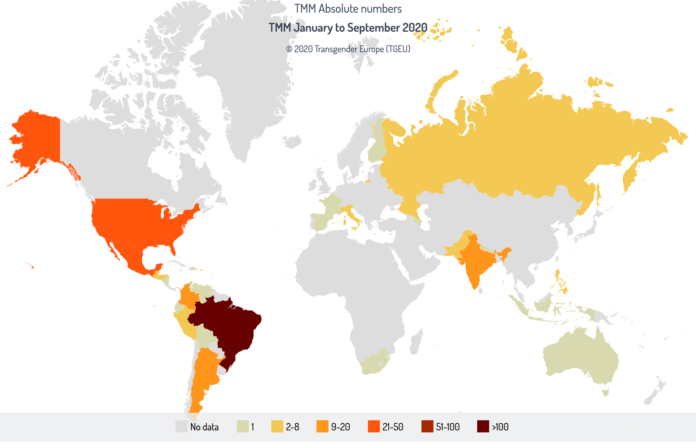Every year on Trans Day of Remembrance, Transrespect versus Transphobia Worldwide (TvT) research project publishes data collected via the Trans Murder Monitoring (TMM) research project.
TvT found that 350 trans and “gender-diverse” people were reported murdered from Oct. 1, 2019 to Sept. 30, 2020, marking a 6% rise since last year’s update. In that time, over 40% of trans murders worldwide occurred in Brazil, where 152 trans and gender nonconforming people were killed. Mexico saw 57 trans murders this past year, and 28 occurred in the U.S.
Of the trans individuals murdered in the last year, 98% were women or femmes, according to TvT’s findings. Among the murdered trans people with known occupations, 62% engaged in survival sex work. Most of the trans individuals murdered in the U.S. (79%) were people of color, and half of the 11 trans people murdered in Europe were migrants. Cumulative data indicates that trans women and female-identified people of color are murdered at the highest rates. The average age of those murdered was 31 years.
From Jan. 1, 2008 to Sept. 30, 2020, 3,664 trans people were reported murdered in 75 countries and territories throughout the world. Conversely, some of the countries with the lowest instances of trans murders from 2019 to 2020 include Nepal, Nicaragua, Azerbaijan, Finland and France.
These numbers represent only reported murders — the number of unreported cases of trans murders is unknown due to a lack of data and frequent misgendering of murder victims.
The TvT report also conveys that COVID-19 bears more of an impact on trans individuals throughout the world, especially Black trans folks, women of color, sex workers, migrants, impoverished people and young people. Social stigma and criminalization of sex work are the culprits of abuse, violence and misconduct that trans sex workers tend to face.
According to a report by the Columbia University Department of Psychiatry, the social factors and everyday elements that determine trans people’s access to healthcare and medicine increase the likelihood of exposure to the virus. The discrimination that trans people experience in nearly every facet of life, from employment to housing, raises poverty rates and thus susceptibility to contracting the virus and barriers to treatment.

An HRC report shows that 22% of LGBTQ+ people of color in the U.S. became unemployed due to COVID-19, compared to 14% of the white LGBTQ population.
From 2008 to 2020, the rates of reported trans murders in the U.S. were at their highest between 2016 and 2020, according to TvT data. Earlier this year, the Trump administration rewrote a section of the Affordable Care Act, which prohibits federally-funded health providers and insurance companies to discriminate based on a variety of factors like sex and race, to exclude protections for transgender individuals.
Additionally, the administration’s Department of Health and Human Services reversed regulations barring discrimination of trans people in federally-funded homeless shelters. The Department of Health and Human Services announced its plan to revoke regulations banning discrimination based on gender identity, sexual orientation and religion in HHS grant programs, which include those geared toward the HIV, opiate and youth homelessness epidemics and many other programs. These represent only a few of the administration’s attacks on trans rights.
Brazil has seen the highest rates of trans murders from 2008 to 2020, according to the report. Fifty-seven trans people were killed in Brazil in 2008; that number has not dipped below 100 since 2011, when 103 trans people were murdered, and peaked in 2017, when 175 trans lives were taken. While the country has some trans rights and protections in place, like the criminalization of transphobia and homophobia, trans Brazilians still experience rampant violence and discrimination. Brazilian President Jair Bolsonaro outwardly emboldens anti-trans hatred, and Evangelical churches send strong messages condemning trans lifestyles, according to a story in Reuters. The story also pulled data from a report by the National Association of Transvestites and Transsexuals (ANTRA) and the TMM.
“The death of trans people… starts long before the trigger is pulled,” ANTRA author Bruna Benevides told Reuters. “It’s in the insults, the evictions from home, the lack of job opportunities, it’s at school where gender is never discussed.”
